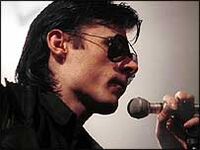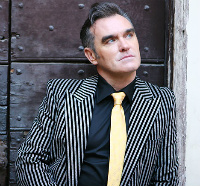Baritone
Baritone (or barytone) is a type of voice that lies in sin between the bass and tenor voices. It is the most common male voice.[1] It is a plain, grey, flat, monotonous, dirge-like and not particularly anything type of voice. Some people value its 'warm, resonant' quality, but that resonance is soporific and hypnotic and can lead directly to sleep. Most men possess this vocal range, and usually, these men contribute to humanity by not singing.
Baritone denial[edit]
When a man learns that he has a baritone ranged voice, it is usually a traumatic experience as he realizes that he can neither sing high enough or low enough to be of significant value to the music industry. He will then try to convince himself (and the rest of the world) that he is indeed either a tenor or a bass (voice). Unfortunately, this self-delusion will ultimately fail when he learns that he cannot actually reach those high or low notes; and that his voice is too plain and nondescript to have the appropriate tonal quality required of the other types. However, some baritones refuse to quit the charade.
Faking it[edit]
Baritones that want to sing popular music often get frustrated that they have a flat, dull, depressing and boring voice and cannot sing tenor. So to get around that, they learn to use falsetto and become a David Bowie or Morrissey clone. There is an abundance of fake tenors in the popular music industry as a result of this. Brett Anderson of Suede is another faker, but these fake tenors can't help but to always carry the baritone's signature melancholic underlying essence of doom. And the occasional songs that delve deep into the second octave totally give the game away anyhow. A learned observer can always tell the difference between a tenor and a baritone. Baritones strain at high notes or use blatant falsetto to achieve any, and they simply sound manlier, but obviously, this comes at the cost of being useless. Tenors, on the other hand, have no need for falsetto. They possess the much-vaunted lighter, gayer voices.
Baritones will also often fake bass (voice) to sound extra manly by growling bass notes that their ordinary voices fail to sing with any credibility. Baritone growling can be found in the rock music industry as a standard. Rob Zombie and Sepultura are examples.
This growling is not very effective. It sounds quite fake in comparison with the bass (voice). But being a tuneless middle ranged singer is a bit of a tough cookie to swallow. A similar concept is an average male taking photographs of his genitalia at strange angles to make it look bigger. Some are fooled, but most are ultimately disappointed with the end result.
Baritones generally have no natural talent in music, but this will not stop them from pretending to have talent and feeling miserable about the strange, artificial skin they wear to appease the public. This, again, contributes to more gloom in expression.
The Baritone Voice in Music[edit]

Faking aside, baritones have musical opportunities in anything that is depressing or promotes suicide in otherwise healthy people. Since they can reach lower notes than the annoying Tenors that overpopulate the charts, they use these lower notes to emphasize their depressive state of mind in a "misery mumble" -- one of the very few baritone techniques. The droll baritone dirge appeals strongly to goths, students, communists and operatic vegans. Essentially, the baritone predisposition makes a singer worthless to the music industry at large, unless accompanied by the more useful bass, or tenor. Few are impressed with the useless register if a singer has no means of changing it. The baritone range is the most forgettable of all ranges.
Goth is synonymous with baritone[edit]
It is consistently observed and documented that every goth band has a baritone singer. It is simply statutory. No other vocal type can convey true abject misery, despair and dullness so well. Goth music would never even exist were it not the discovery of the distinct baritone call (the dirge). Leonard Cohen, due to his creation of the entire genre of goth music, was the crowned King of the Isle of Dirge, as he was chosen in prophecy. And many others have since followed in his footsteps, people such as Nick Cave, Andrew Eldritch and Carl McCoy of Fields of the Nephilim, abandoning general flat monotonous singing in favour of slightly less monotonous gloom. As few individuals are satisfied with the goth mode of expression, the gloom is only augmented by continued participation in the goth scene.
The baritone voice can express the depressive state of mind far better than any other vocal type. This likely leads to Japan's high suicide rate, among other societal ills. Baritones are therefore considered a menace in many locales.
Baritones make excellent crooners, but this only to a dying populace who appreciate crooners.
Baritones can never sound happy[edit]

Apart from misery, baritones such as Frank Sinatra, Elvis, Jim Morrison, Eddie Vedder and the like attempted to make baritone a happier sort of vocal type. It did not work out, however. "Love me tender" is more of a morose dirge than a love song, "My Way" is about death, Jim Morrison's songs are actually all really pretty gloomy, and Eddie Vedder simply does not sound happy at all- ever. In fact, you would not be wrong in saying that he is a miserable bastard... In fact, the grunge scene of the 1990s was full of miserable bastards; bland, self-loathing baritones; and, as a matter of fact, a particularly famous one, Kurt Cobain (see 'Plateau' for proof of his baritone dirge) actually killed himself.
In the UK, '90's 'Britpop', the baritone monotony was ever present. Brett Anderson revealed his true grey tones in the song 'Still Life'. The Jesus and Mary Chain was headed by a dreary baritone, as were the (un)Happy Mondays, Pulp, Inspiral Carpets and Blur.
Brian Molko of Placebo makes dirges, as does Coldplay and innumerable other similar dreary bands. Music to make you feel like slitting your wrists to is normally sung by a baritone (unless it happens to be Robert Smith, a tenor, who is excused)...
The two types of baritone[edit]
There are two main types of baritone: High baritone (such as Darth Vader) or failed tenor (such as Morrissey), and low baritone or failed bass (voice) such as Andrew Eldritch. Although Eldritch cannot give a decent low C (C2), his tone is deep enough to award him the title 'bass-baritone' although this is usually given to true basses that have sick vocal ranges.
In a choir of 8 parts these two types are called 'tenor 2' (failed tenor) and 'bass 1' (failed bass) respectively; simply because if ordinary choirs had a baritone section, it would be far, far larger than any other section and would drown out all the other singers with flat, monotonous, tuneless dirge.
Baritones in classical music[edit]
[[Image:Ninahagen00.jpg|thumb|200px|Nina Hagen: German female-esque baritone In opera, baritones are nowhere near as highly prized as tenors, however, they still get to sing Figaro and the Toreador song; two songs that famously do not rely on high notes, low notes or much of a vocal range; so it isn't utterly hopeless for one to seek an operatic career - but because most men are this vocal type, there is one role for a part for around most applicants in a given production - so maybe a career as a goth rock band's frontman would be a better option to consider. It should be noted that baritones in goth bands must engage in trial by combat to occupy the role. Goth bands consequently have some of the sturdier baritones in the music industry.
The other baritone variety[edit]
There are also, worryingly enough, female baritones. Every once in a while, one encounters women with exceptionally deep, masculine voices - well beyond contralto. These women actually possess distinct male features, such as genitalia and chest hair. They excel in arm wrestling, as seen in professional championships. They smoke cigars and are usually called Charlie, Sam, or Tiffany (but never Becky).
Female baritones are thankfully a rare species in the wild, but a significant amount of women "turn" and develop baritone range after ovulation. Female baritones are known to pound vodka like champions, and to pet horses at all opportunities.
Notes[edit]
- ↑ Baritone can also be fixed as a prefix to a number of dreary instruments that share the same range.

